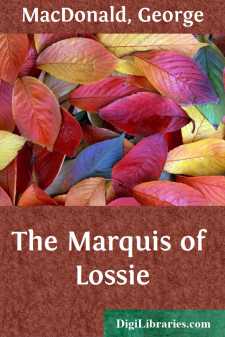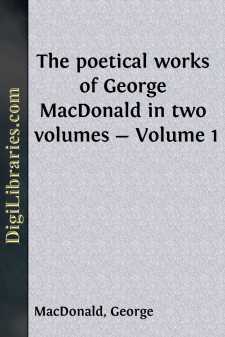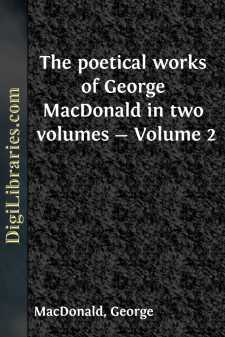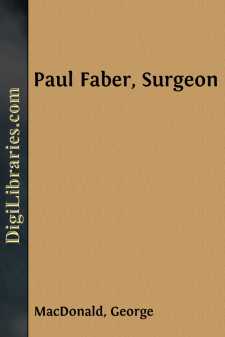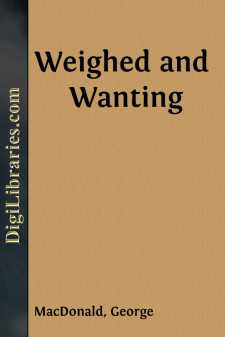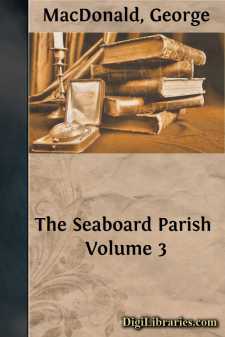Categories
- Antiques & Collectibles 13
- Architecture 36
- Art 48
- Bibles 22
- Biography & Autobiography 813
- Body, Mind & Spirit 138
- Business & Economics 28
- Children's Books 12
- Children's Fiction 9
- Computers 4
- Cooking 94
- Crafts & Hobbies 4
- Drama 346
- Education 46
- Family & Relationships 57
- Fiction 11821
- Games 19
- Gardening 17
- Health & Fitness 34
- History 1377
- House & Home 1
- Humor 147
- Juvenile Fiction 1873
- Juvenile Nonfiction 202
- Language Arts & Disciplines 88
- Law 16
- Literary Collections 686
- Literary Criticism 179
- Mathematics 13
- Medical 41
- Music 40
- Nature 179
- Non-Classifiable 1768
- Performing Arts 7
- Periodicals 1453
- Philosophy 64
- Photography 2
- Poetry 896
- Political Science 203
- Psychology 42
- Reference 154
- Religion 505
- Science 126
- Self-Help 81
- Social Science 81
- Sports & Recreation 34
- Study Aids 3
- Technology & Engineering 59
- Transportation 23
- Travel 463
- True Crime 29
Sort by:
by:
George MacDonald
It was one of those exquisite days that come in every winter, in which it seems no longer the dead body, but the lovely ghost of summer. Such a day bears to its sister of the happier time something of the relation the marble statue bears to the living form; the sense it awakes of beauty is more abstract, more ethereal; it lifts the soul into a higher region than will summer day of lordliest splendour....
more...
by:
George MacDonald
CHAPTER I. CASTLE WARLOCK. A rough, wild glen it was, to which, far back in times unknown to its annals, the family had given its name, taking in return no small portion of its history, and a good deal of the character of its individuals. It lay in the debatable land between highlands and lowlands; most of its inhabitants spoke both Scotch and Gaelic; and there was often to be found in them a notable...
more...
by:
George MacDonald
WITHIN AND WITHOUT PART I. Go thou into thy closet; shut thy door; And pray to Him in secret: He will hear. But think not thou, by one wild bound, to clear The numberless ascensions, more and more, Of starry stairs that must be climbed, before Thou comest to the Father's likeness near, And bendest down to kiss the feet so dear That, step by step, their mounting flights...
more...
by:
George MacDonald
THE MAN OF SONGS. "Thou wanderest in the land of dreams, O man of many songs!To thee what is, but looks and seems; No realm to thee belongs!" "Seest thou those mountains, faint and far, O spirit caged and tame?""Blue clouds like distant hills they are, And like is not the same." "Nay, nay; I know each mountain well, Each cliff, and peak, and dome!In that...
more...
by:
George MacDonald
A HIDDEN LIFE. Proudly the youth, by manhood sudden crowned,Went walking by his horses to the plough,For the first time that morn. No soldier gayFeels at his side the throb of the gold hilt(Knowing the blue blade hides within its sheath,As lightning in the cloud) with more delight,When first he belts it on, than he that dayHeard still the clank of the plough-chains againstThe horses' harnessed...
more...
by:
George MacDonald
CHAPTER I. THE LANE. The rector sat on the box of his carriage, driving his horses toward his church, the grand old abbey-church of Glaston. His wife was inside, and an old woman—he had stopped on the road to take her up—sat with her basket on the foot-board behind. His coachman sat beside him; he never took the reins when his master was there. Mr. Bevis drove like a gentleman, in an easy,...
more...
by:
George MacDonald
CHAPTER I. HOMILETIC. Dear Friends,—I am beginning a new book like an old sermon; but, as you know, I have been so accustomed to preach all my life, that whatever I say or write will more or less take the shape of a sermon; and if you had not by this time learned at least to bear with my oddities, you would not have wanted any more of my teaching. And, indeed, I did not think you would want any more....
more...
by:
George MacDonald
CHAPTER I. BAD WEATHER. It was a gray, windy noon in the beginning of autumn. The sky and the sea were almost of the same color, and that not a beautiful one. The edge of the horizon where they met was an edge no more, but a bar thick and blurred, across which from the unseen came troops of waves that broke into white crests, the flying manes of speed, as they rushed at, rather than ran towards the...
more...
by:
George MacDonald
CHAPTER I. A WALK WITH MY WIFE. The autumn was creeping up on the earth, with winter holding by its skirts behind; but before I loose my hold of the garments of summer, I must write a chapter about a walk and a talk I had one night with my wife. It had rained a good deal during the day, but as the sun went down the air began to clear, and when the moon shone out, near the full, she walked the heavens,...
more...
by:
George MacDonald
Chapter I My Boyhood. My father belonged to the widespread family of the Campbells, and possessed a small landed property in the north of Argyll. But although of long descent and high connection, he was no richer than many a farmer of a few hundred acres. For, with the exception of a narrow belt of arable land at its foot, a bare hill formed almost the whole of his possessions. The sheep ate over it,...
more...


